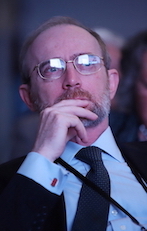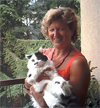Studying at the University of Verona
Here you can find information on the organisational aspects of the Programme, lecture timetables, learning activities and useful contact details for your time at the University, from enrolment to graduation.
Academic calendar
The academic calendar shows the deadlines and scheduled events that are relevant to students, teaching and technical-administrative staff of the University. Public holidays and University closures are also indicated. The academic year normally begins on 1 October each year and ends on 30 September of the following year.
Course calendar
The Academic Calendar sets out the degree programme lecture and exam timetables, as well as the relevant university closure dates..
| Period | From | To |
|---|---|---|
| Sem. 1A | Sep 24, 2018 | Nov 10, 2018 |
| Sem. 1B | Nov 19, 2018 | Jan 12, 2019 |
| Sem. 2A | Feb 18, 2019 | Mar 30, 2019 |
| Sem. 2B | Apr 8, 2019 | Jun 1, 2019 |
| Session | From | To |
|---|---|---|
| Sessione Invernale | Jan 14, 2019 | Feb 16, 2019 |
| Sessione Estiva (Gli esami sono sospesi durante la Sessione di laurea) | Jun 3, 2019 | Jul 27, 2019 |
| Sessione Autunnale | Aug 26, 2019 | Sep 21, 2019 |
| Session | From | To |
|---|---|---|
| Sessione Estiva | Jul 8, 2019 | Jul 13, 2019 |
| Sessione Autunnale | Nov 4, 2019 | Nov 9, 2019 |
| Sessione Invernale | Mar 30, 2020 | Apr 4, 2020 |
| Period | From | To |
|---|---|---|
| Festa di Ognissanti | Nov 1, 2018 | Nov 1, 2018 |
| Festa dell’Immacolata | Dec 8, 2018 | Dec 8, 2018 |
| Vacanze di Natale | Dec 22, 2018 | Jan 6, 2019 |
| Vacanze di Pasqua | Apr 19, 2019 | Apr 23, 2019 |
| Festa della liberazione | Apr 25, 2019 | Apr 25, 2019 |
| Festa del lavoro | May 1, 2019 | May 1, 2019 |
| Festa del Santo Patrono - S. Zeno | May 21, 2019 | May 21, 2019 |
| Festa della Repubblica | Jun 2, 2019 | Jun 2, 2019 |
| Vacanze Estive | Aug 12, 2019 | Aug 17, 2019 |
Exam calendar
Exam dates and rounds are managed by the relevant Humanistic Studies Teaching and Student Services Unit.
To view all the exam sessions available, please use the Exam dashboard on ESSE3.
If you forgot your login details or have problems logging in, please contact the relevant IT HelpDesk, or check the login details recovery web page.
Should you have any doubts or questions, please check the Enrollment FAQs
Academic staff
 claudia.annechini@univr.it
claudia.annechini@univr.it
 linda.napolitano@univr.it
linda.napolitano@univr.it

Pozzo Riccardo
 riccardo.pozzo@univr.it
riccardo.pozzo@univr.it
 +390458028053
+390458028053
 nicola.righetti@univie.ac.at
nicola.righetti@univie.ac.at
Study Plan
The Study Plan includes all modules, teaching and learning activities that each student will need to undertake during their time at the University.
Please select your Study Plan based on your enrollment year.
2° Year activated in the A.Y. 2019/2020
| Modules | Credits | TAF | SSD |
|---|
2 modules among the following| Modules | Credits | TAF | SSD |
|---|
2 modules among the following| Modules | Credits | TAF | SSD |
|---|
3 modules among the following3 modules among the following1 module among the followingLegend | Type of training activity (TTA)
TAF (Type of Educational Activity) All courses and activities are classified into different types of educational activities, indicated by a letter.
Epistemology and Philosophy of Science (2018/2019)
Teaching code
4S007336
Teacher
Coordinator
Credits
6
Language
Italian
Scientific Disciplinary Sector (SSD)
M-FIL/02 - LOGIC AND PHILOSOPHY OF SCIENCE
Period
Sem. 2B dal Apr 8, 2019 al Jun 1, 2019.
Learning outcomes
The purpose of the course is not only to provide students with the conceptual grounds of the philosophy of science (i.e., realism, objectivity, experimental evidence, etc.), but also to make them able to understand the fundamental (and problematical) assumptions of Positivism, the relationship between the twentieth century “linguistic turn” of philosophy and the philosophy of science and, finally, the implications of the sociological methodology when applied to epistemological subjects. Together with conceptual clarity, the course pays special attention to the acquisition of the terminological precision, which is necessary to deal with contemporary epistemological debate.
Program
Syllabus
The course aims to provide an answer (which does not claim to be exhaustive, but rather tries not to be defective) to the following questions: what is the value of science in the contemporary debate? What importance does the history of science have in the development of new epistemological paradigms?
The contents of the course are:
1) Outlines of the history of philosophy of science: from logical positivism to the contemporary debate;
2) The transition from scientific realism to the constructivist approach to science of epistemological sociology;
3) From Verification to Falsification: the role of experience in the elaboration of scientific theories;
4) Kuhn and scientific revolutions: from the concept of linear development of science to "paradigmatic jumps";
5) Feyerabend’s epistemological irrationalism.
Didactic Methods
The teaching methods consist of traditional lectures that will be divided into two parts:
1) a general part, which intends to introduce to the contemporary philosophy of science, through the analysis of some important moments of scientific development and the philosophical issues involved in. In this general part, we will follow the order of the arguments of Oldroyd’s History of the Philosophy of Science (original title: The Arch of Knowledge), together with anthological material that will be uploaded (in full compliance with copyright laws) on the e-learning platform of the University website;
2) a monographic part dedicated to the Feyerabend’s text, Against Method, that will be read and analysed in the light of the historical and epistemological notions acquired in the first part of the course.
By means of power point presentations, on the one hand, both the teaching and the learning will be more clear and immediate and, on the other hand, students will be encouraged to actively participate to lessons.
Each lesson will be recorded in mp3 format and, together with all the material analysed during the course, will be punctually loaded on the e-learning platform of the University with the aim of easing the study for both attending students and those who can not attend lectures.
During the academic year, an individual consultation service is also available at the teacher's study, at the times indicated on the web pages and readily updated.
At the first lesson, students will receive the full calendar of teaching activities, together with the dates and classroom in which the lessons will take place and a synoptic presentation of the subject of the course.
Any suspension of lectures for academic reasons will be readily communicated in the classroom, on the web site, and on the e-learning platform forum.
Reference texts
The texts required are as follows:
1) David Oldroyd, Storia della filosofia della scienza. Da Platone a Popper e oltre, Milano, Il Saggiatore (Net), 2002, capp. VI-IX.
2) Paul Feyerabend, Contro il metodo, Milano, Feltrinelli, 2013.
The reference texts are the same for both attending students and those who can not attend lectures.
Further informations, additional texts, and teaching materials will be communicated on the e-learning platform of the University website.
| Author | Title | Publishing house | Year | ISBN | Notes |
|---|---|---|---|---|---|
| Paul Feyerabend | Contro il metodo | Feltrinelli | 2013 | ||
| David Oldroyd | Storia della filosofia della scienza. Da Platone a Popper | NET, Milano | 2002 |
Examination Methods
Examination arrangements
The assessment of the learning outcomes of both the key concepts and the issues which concern both the philosophy of science and the Feyerabend’s text will be done by means of an oral examination concerning the programme carried out during the course. This examination consists of questions to test the critical and argumentative abilities of the students, the textual exegesis, the conceptual clarity, and the acquisition of an adequate philosophical vocabulary.
The grades are expressed in thirtieths.
The examination is the same for both attending students and non-attending ones.
[[[UPDATE !!! UPDATE !!! Due to the COVID-19 emergency, the examination arrangements will be modified during the 2020 summer session, in accordance with the University of Verona guidelines: the examinations will be online oral exams. ]]]
Type D and Type F activities
Modules not yet included
Career prospects
Module/Programme news
News for students
There you will find information, resources and services useful during your time at the University (Student’s exam record, your study plan on ESSE3, Distance Learning courses, university email account, office forms, administrative procedures, etc.). You can log into MyUnivr with your GIA login details: only in this way will you be able to receive notification of all the notices from your teachers and your secretariat via email and soon also via the Univr app.
Competenze linguistiche
I crediti formativi universitari relativi alle "Ulteriori competenze linguistiche" (B1 informatizzato se seconda lingua; livello B2 completo se stessa lingua della triennale) possono essere acquisiti in una delle due seguenti modalità:
- iscrizione da parte della/o studente presso il Centro Linguistico di Ateneo (CLA ➔ https://cla.univr.it/it/test-e-certificazioni) per il sostenimento e il superamento delle prove + iscrizione, sempre da parte della/o studente, in apposita lista per la registrazione crediti e registrazione CFU (senza presenza) da parte dell’Università.
Oppure
- equipollenza di certificazioni linguistiche esterne: riconoscimento equipollenza di certificazioni linguistiche esterne (➔ https://cla.univr.it/it/servizi/riconoscimento-delle-certificazioni-linguistiche-esterne).
Gestione carriere
Linguistic training CLA
Internships
Graduation
Documents
| Title | Info File |
|---|---|
|
|
pdf, it, 99 KB, 13/10/23 |
|
|
pdf, it, 101 KB, 10/04/24 |
List of theses and work experience proposals
| theses proposals | Research area |
|---|---|
| Linguaggio e mito in Tolkien | ENGLISH LITERATURE - Critical Theory & Poetics |
| Dialettica del negativo in Meister Eckhart | HISTORY OF PHILOSOPHY - MIDDLE AGES |
| La felicità nel Medioevo | HISTORY OF PHILOSOPHY - MIDDLE AGES |
| Le figure di Eva e Maria in Ildegarda di Bingen | HISTORY OF PHILOSOPHY - MIDDLE AGES |
| IA. Una critica fenomenologica al concetto di Intelligenza Artificiale | The Human Mind and Its Complexity: Cognitive science, psychology, linguistics, philosophy of mind - Philosophy of science, epistemology and logic |
Practical information for students
Documents
| Title | Info File |
|---|---|
|
|
pdf, it, 325 KB, 02/05/23 |
|
|
pdf, it, 212 KB, 02/05/23 |
|
|
pdf, it, 131 KB, 02/05/23 |






















